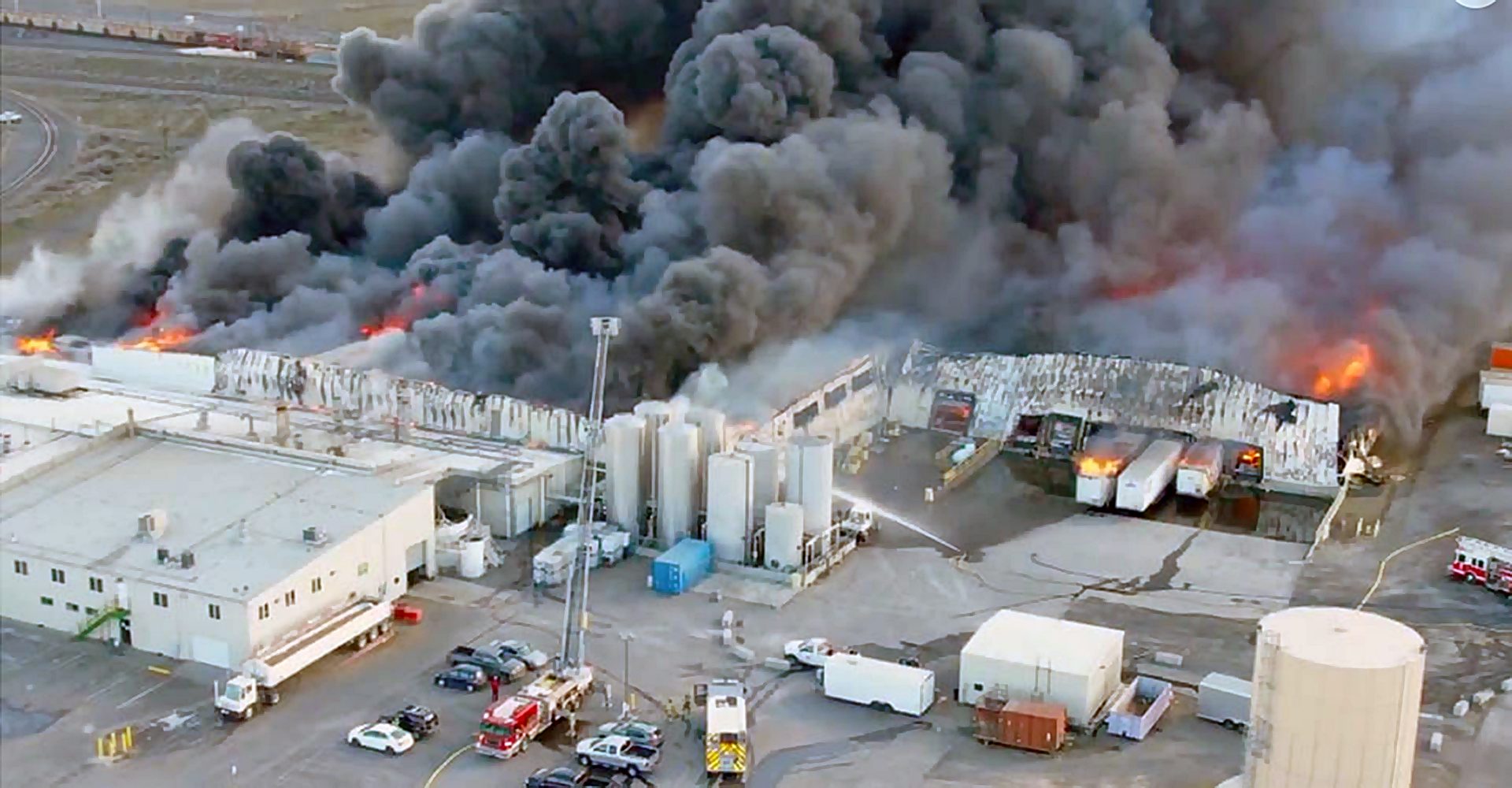

What You Need to Know about Plant Fire Insurance Claims
Dealing with insurance claims is daunting even for the most sophisticated business owner. The sooner a fire insurance claim is settled, the better, right? Not so fast.
By Scott Friedson
Insurance companies may not necessarily be in a big hurry to pay up, here's what business owners need to know about fire insurance claims.
The number of recent food processing fires has caught national attention. Safety, food supply and propaganda are certainly concerns, but so is the recovery process to get these food processors back to business.
Avoiding a double disaster following a fire or any other peril means getting the full benefit of your policy coverage fairly and promptly while avoiding unnecessary underpayments, delays, lawsuits or appraisals. Knowing your rights, remedies and having a risk-management strategy in place to assist you to meet the burden of proving your claim makes all the difference in settling insurance claims fairly and properly.
While there is an implied duty for insurers to act in good faith and handle claims properly, the burden of proving claim damages is on the policyholder. Herein lies the foundation of the inherent conflict of interest built into the insurance business model.
ADVERTISEMENT
The Adversarial Relationship Claims Create
When a policyholder pays their premiums, they are considered an asset to an insurer. However, when a policyholder has a claim, you are considered a liability. The moment a policyholder files a claim, the insurer has representatives in place to protect their interests, not the policyholders. There is an asymmetry of information. Your insurer wrote your policy and knows insurance code statutes, case law, damage, and risk models. Meanwhile, policyholders typically don't understand their entire policy and know their rights or options available to protect their interests. Then there’s an asymmetry of power. Policyholders have no negotiating power when purchasing a policy. Insurers have the policyholder’s money, they have their terms in the policy and their representatives in place to manage their risk of liability from policyholders with legitimate claims in need to be properly indemnified from their insurer.
This win-lose value proposition has caught the attention of the Supreme Court of Texas stating, “the insurance claim process is inherently adversarial. The adversarial process begins as soon as a claim is filed and ends only when the resolution of the claim is finally determined and accepted by the parties.” Barbara Technologies Vs. State Farm Lloyds

In February, a boiler exploded at a Shearer's Foods potato chip plant south of Hermiston, Ore.
Insurance Claim Disputes
Insurance companies are masters at pontificating the belief that you’ll be covered under your policy. However, insurance claim disputes are a common scenario that leads to underpayments, delays and lawsuits. It’s easy to assume that disagreements about whether or not damaged property should be repaired or replaced seem obvious but overcoming an insurer’s argument to repair damages that you believe need replacement may take more than just an opinion.
That goes for the insurer too. Insurers handle claims every day and are aware of damage related to heat, moisture, acidic gases and combustion byproducts. “For an insured (handling one claim) to level the playing field, appropriate representation is necessary for a full assessment and proving all damage” as noted by Jeff Schwenk, president, Continental Machinery Company.
Proving a claim and getting a fair settlement can be rigorous and require a precise strategy. Questioning the legitimacy of your insurer’s position, disputing items such as excessive depreciation, including overhead and profit, required building code upgrades, ordinance/law coverage, professional fees, business interruption income loss calculations, OSHA safety requirements, ADA, preparing replacement cost valuations, interpreting policy language, as well as understanding conditions and terms related to debris removal, water extraction, smoke removal and mold remediation ensuing from a fire insurance claim, are liabilities policyholders with a fire insurance claim must endure. For example, a liability many policyholders are unaware of is that if your fire suppression system is not operational, your policy may require you to hire security onsite 24/7 or you could suffer a loss of benefits.
Endorsements for Extra Expense Insurance is coverage that pays for our company's ordinary expenses after a disruptive incident it provides cash to help your business stay operational while the property is being repaired or replaced without this financial assistance, businesses that suffer a major loss might have to close permanently.
Code enforcement officers may require code upgrades for properties that are older. Most insurance policies do not pay for code upgrades before that expense is incurred by the policyholder. Code upgrades typically have separate dollar limits from the rest of your insurance policy and can be tricky points when interpreting your policy language and benefits.
Proving a claim and getting a fair settlement can be rigorous and require a precise strategy.
The list goes on and on. To reasonably comply with most policies associated with large loss insurance claims, policyholders endure numerous details including disputing insurer retained expert reports and asserting policyholder retained expert opinions, submitting department of insurance bulletins, evidence of damage, evidence of occurrence, 3rd party credibility, and making a reasonable demand for payment to the insurance company.
Understandably, most policyholders simply don’t know what to do or where to start. You have options, rights, and remedies to settling property damage insurance claims. The best non-litigious approach while still preserving your consumer rights is by working with a licensed, ethical public insurance adjuster on a contingency fee basis to represent your interests.
There’s a lot of risk in owning commercial real estate. Property owners' buildings are always at risk and it’s just not right when insurance companies do not pay fairly and promptly. Many policyholders have certainly felt the urge to hire an attorney, file a lawsuit to sue their insurance company, and go through subpoenas, depositions, discovery, mediation and court when they are convinced their insurer has acted in bad faith. What many policyholders have found is that the legal process takes a lot of time, adds stress and so much of the documentation requirements to prove up a claim in a lawsuit are included in a legitimate public adjuster’s claim submissions. Many have found the best course of action in settling a claim is to engage ethical, experienced and non-litigious public insurance adjusters at the beginning of a claim who know how to personally and factually present evidence that supports your position, comply with policy terms, assert relevant statutory insurance codes, knows how to compel an insurer to perform fairly.
Our successful approach has helped commercial real estate property owners realize maximum insurance claim settlement results in minimum time without unnecessary litigation for over a decade. Insurance companies have experts working for them. You should too.
Best of all, there is no fee for his services if there’s no recovery. That, however, has never happened.
Insurance companies manage risk. So, if a policyholder has exposed all of the insurer’s liability in writing with supporting evidence, documentation, presented a valid argument for coverage, exhausted all reasonable and necessary efforts to avoid unnecessary litigation to settle a claim, and is still forced to sue to settle an insurance claim dispute then a claim may be ripe to consider filing complaints to the department of insurance and retain a board certified insurance attorney.
Understandably, most policyholders simply don’t know what to do or where to start. You have options, rights and remedies to settling property damage insurance claims.
The Advantages of Delaying a Claim
Many bad faith insurance companies not only deploy tactics to wear down policyholders but some of their defense attorneys who represent them promote that delaying claims may provide several benefits for insurers. First, they know delaying a claim puts pressure on policyholders. They know you may be dealing with mounting bills for property damage, legal fees and medical expenses. Most people cannot afford to continue fighting insurance companies for a prolonged time. This means that most policyholders will be forced to settle for an amount favorable for the insurer by wearing down a claimant instead of continuing to negotiate with insurance companies for an extended period. In other words, they know that delaying claims forces policyholders to accept lower settlement offers.
Delaying claims can lower insurance company costs in other ways. For example, when an insurance company faces a surge of property damage claims, they can delay some of them to avoid mass payouts all at once. This limits the financial stress on insurers, shifts it to the policyholder and allows insurers to invest funds from your paid premiums to earn interest revenue and offset some of the costs.
You wouldn’t have the IRS prepare your tax return and tell you what you owe. So why would you let your insurance company prepare your claim file for you and tell you what they’re going to pay you?
Are some insurance companies so sinister they would improperly handle any of these food plant claims to further prolong the recovery process? Hopefully not, but perhaps the most shameful part of every insurance claim is that a portion of every policyholder’s premium is allocated to claims handling expenses.
This leaves some policyholders feeling they are paying insurance company adjusters to work against them as their adversaries and that’s just not right.
Scott Friedson is a public insurance adjuster and CEO of Insurance Claim Recovery Support LLC (ICRS). For more information contact him at 512-904-9900 or scott@insuranceclaimrecoverysupport.com.
